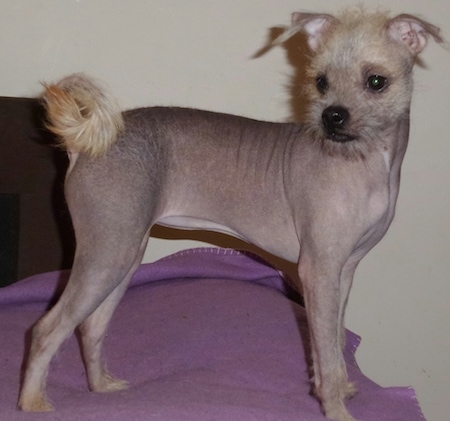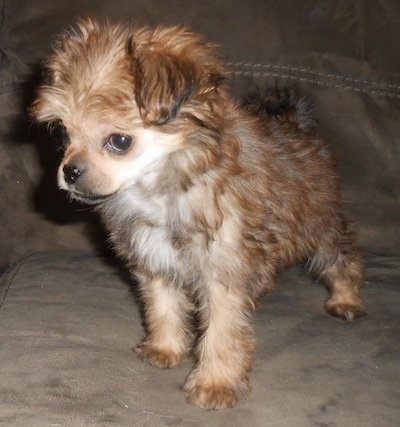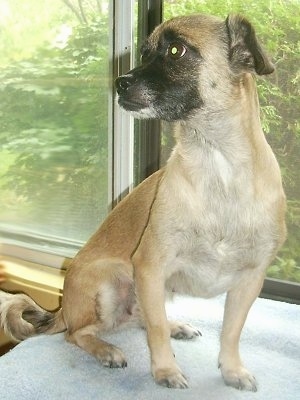Pugese

Breed Information
Is Pugese a purebred?
Cross Breed
What were Pugeses originally used for?
Companion
How Long Do Pugeses Live? What is average life expectancy for a Pugese? How long can Pugeses live?
11-15 years
The average Pugese lifespan is somewhere between 11-15 years, provided they aren't beset by any exceptional health issues or injuries.
Pugese Height & Weight
How big is a full grown Pugese?

| Height | ||||
|---|---|---|---|---|
| Average | 6 months | 12 months | 18 months | |
| Male | 10-13 inches (25.4 - 33 cm) | 10.5 inches (26.7 cm) | 11.5 inches (29.2 cm) | 11.5 inches (29.2 cm) |
| Female | 10-13 inches (25.4 - 33 cm) | 10.5 inches (26.7 cm) | 11.5 inches (29.2 cm) | 11.5 inches (29.2 cm) |
| Weight | ||||
|---|---|---|---|---|
| Average | 6 months | 12 months | 18 months | |
| Male | 11-15 pounds (5 - 7 kg) | 10.0 pounds (5 kg) | 13.0 pounds (6 kg) | 13.0 pounds (6 kg) |
| Female | 11-15 pounds (5 - 7 kg) | 10.0 pounds (5 kg) | 13.0 pounds (6 kg) | 13.0 pounds (6 kg) |
Are Pugeses Hypoallergenic?
No
Unfortunately, the Pugese is not hypoallergenic, making it not a good choice for a dog lover who suffers from pet allergies.
What is a Pugese personality? What are Pugese dogs best known for?
Playful
Happy
Alert
Courageous
Intelligent
Friendly
Affectionate
Loyal
Lively
Gentle
Going
Tempered
Sweet
Cheerful
Are Pugeses heavy shedders? How Much Does a Pugese Shed?
![]()
![]()
![]()
![]()
![]()
Pugese dogs are not heavy shedders, but they will lose a significant amount of hair each year. To decrease the amount of shedding, you can regularly brush your Pugese. This will remove loose hair and keep his coat growing in the same direction.
What is the watchdog ability of a Pugese dog?
![]()
![]()
![]()
![]()
![]()
Pugeses are not the best watchdogs. If you want a guard dog, the Pugese is not the breed for you. They will 'watch' everything - but that's usually as far as they go.
Breed History
What are Pugeses descended from?
Chinese Crested and Pug
What organizations or kennel clubs recognize/register the Pugese breed?
ACHC = American Canine Hybrid Club
DBR = Designer Breed Registry
DDKC = Designer Dogs Kennel Club
DRA = Dog Registry of America, Inc.
IDCR = International Designer Canine Registry®
When were Pugeses first bred? How old is the Pugese breed?
Unknown

Pugese Appearance
What color are Pugese eyes?
Blue
Hazel
Brown
Amber
What color can Pugese nose be naturally?
Black
Brown
What color can Pugese coat be naturally?
Black
Fawn
Blue
Brown
Cream
Pied
White
Sable
How long is a Pugeses coat?
![]()
![]()
![]()
![]()
![]()
Pugeses are known for their short coat.
How Dense Is The Pugese Coat?
![]()
![]()
![]()
![]()
![]()
What is the texture of the hair of a Pugese?
Straight
How many puppies can a Pugese have in a litter? How many puppies can a Pugese have in her first litter?
2-5 puppies per pregnancy
A Pugese can have a litter of 2-5 puppies on average. However, it's worth noting that the size of the litters can vary greatly. Factors that can influence litter size include the health of the mother, breeding history, and genetics.
![]()
![]()
![]()
![]()
![]()
The adaptability of Pugese dogs is a well-known trait, they are known for being able to adjust well to different living environments and lifestyle changes.

Pugese Health Issues
Do Pugeses have a lot of health problems?
![]()
![]()
![]()
![]()
![]()
The Pugese breed is commonly healthy with low vet costs, regular check-ups may not be as necessary but it's important to keep an eye on their health and have them checked by a veterinarian when needed.
What are the major health concerns to be aware of when owning a Pugese?
Patellar Luxation
Dental Disease
Pug Dog Encephalitis
Keratoconjunctivitis Sicca (Dry Eye)
What are the less significant issues to keep in mind when it comes to Pugeses?
Canine Hip Dysplasia
Glaucoma
Lens Luxation
Legg-Calve-Perthes Disease
Brachycephalic Syndrome
Progressive Retinal Atrophy (PRA)
Skin Diseases and Disorders
Demodicosis
Deafness
Hemivertebra
Seizures
What are the occasional tests recommended for Pugese breed?
Eye Examination
Skin Evaluation
Dental and Oral Examinations
X-rays or other radiographic imaging

Pugese Needs and Activities
Do Pugeses have a lot of energy?
![]()
![]()
![]()
![]()
![]()
Pugeses are known for their high energy levels, so if you're looking for a more low-key dog, this breed may not be the best choice.
Do Pugeses need socialization? How social are Pugeses?
![]()
![]()
![]()
![]()
![]()
Pugese have very high social needs. These needs include regular mental and physical stimulation, a job or purpose, and companionship. They thrive in environments where they have a lot of interaction with humans and other dogs.
How much exercise should Pugeses get?
![]()
![]()
![]()
![]()
![]()
The Pugese dog needs significant physical activity to maintain a healthy lifestyle. They are also well-suited for those who lead an active lifestyle and enjoy activities such as running, hiking, or other outdoor pursuits.
How much sleep should a Pugese have? Do Pugeses sleep a lot?
![]()
![]()
![]()
![]()
![]()
The Pugese breed is known for their relaxed and calm nature and tendency to sleep for long periods of time.
How much does it bark?
![]()
![]()
![]()
![]()
![]()
Pugese dogs tends to bark less frequently than most other dogs. They tend to be quieter and less vocal than other breeds. They may only bark when necessary, such as to alert their owner of something or to communicate something. They do not bark excessively, and may not bark as much as other dogs in certain situations, such as when they are left alone.
Are Pugeses mouthy?
![]()
![]()
![]()
![]()
![]()
What is the likelihood of a Pugese running away? Do they have a tendency to explore or wander frequently?
![]()
![]()
![]()
![]()
![]()
Do Pugese dogs have a high prey drive?
![]()
![]()
![]()
![]()
![]()
What do Pugeses enjoy doing? How do I keep my Pugese busy?
Cuddles, Fetch games, Long walks, Cuddletime, Treattime, Grooming, Treat time, Sitting, Riding in Car
What is the energy level of a Pugese? How much energy does a Pugese have?
Low
Pugeses are low-energy dogs. This breed make a great companion for a relatively inactive person. Pugese dogs require a few short daily walks, and then they're happy snuggling next to you for the rest of the day.
![]()
![]()
![]()
![]()
![]()
How far should a Pugese walk each week? How many miles should a Pugese walk every week?
5 miles / week
There's really no limit to how far you walk your dog as long as they're comfortable. For Pugese, it's at least 5 miles / week. Just remember to build distance and stamina gradually over time.
How much a Pugese should exercise a day? How much activity does a Pugese need?
30 minutes
In general most Pugeses usually need at least 30 minutes of exercise daily. This can be spread across the day and include all sorts of high-energy activities, like walking, running and playing.
What level of grooming should be provided for a Pugese?
![]()
![]()
![]()
![]()
![]()
The Pugese is a breed of dog that is known for its low grooming needs.
How often should you brush a Pugese?
Weekly
Pugese should be brushed at least once a week. Of course you can give them more frequent brushes if you find that they are still shedding a lot
What are the most commonly used brushing tools for Pugeses?
Slicker Brush
Comb
Scissors
Nail Clipper
Costs
How many cups of food does a Pugese eat?
1 cups
For an average 11-15 pound (5 - 7 kg) Pugese feed 1 cups daily. But, keep in mind, the amount you feed is going to be dependent on the quality of the food you are feeding.
How Much Does a Pugese Cost Daily?
$1.10 - $1.40 / day
The average cost of a Pugese is somewhere $1.10 - $1.40 per day.
How Much Does a Pugese Cost Per Month?
$28 - $42 / month
The average per month expenses of a Pugese is between $28 - $42. This makes an average of $336 - $504 per year. It will be on the higher side when the dog is still small because it will need more frequent visits to the vet, shots.
Pugese Characteristic
How intelligent is a Pugese?
![]()
![]()
![]()
![]()
![]()
Pugeses has average obedience intelligence. But, they're also independent thinkers. The Pugese is a breed with an exceptionally high IQ and may get into mischief if left to their own devices.
How sensitive is a Pugese dog?
![]()
![]()
![]()
![]()
![]()
This dog breed is more sensitive than others and easily overwhelmed by new surroundings and people. They need gentle handling and a calm, stable home environment with positive reinforcement training.
Are Pugese dogs affectionate?
![]()
![]()
![]()
![]()
![]()
Do Pugese do well in apartments? Are Pugeses good indoor dogs?
![]()
![]()
![]()
![]()
![]()
Pugeses are known for being excellent apartment dogs. They are fairly active indoors and will do okay without a yard.
Are Pugeses good with kids? Are Pugeses good around children?
![]()
![]()
![]()
![]()
![]()
Pugeses are kid-friendly dogs. They are good with children and excellent dogs with children if they are socialized and trained at a young age.
Are Pugeses good for elderly?
![]()
![]()
![]()
![]()
![]()
Are Pugeses good with cats? How friendly Pugeses are toward cats?
![]()
![]()
![]()
![]()
![]()
Pugeses are very cat friendly dogs. They generally make good companions for cats.
Do Pugese dogs get along with other dogs? Are Pugeses OK with other dogs?
![]()
![]()
![]()
![]()
![]()
Pugeses are friendly, active and loyal companions. They generally love to be around other dogs, making them a good family pet for some,
How do Pugese dogs interact with other pets? Are they considered pet-friendly?
![]()
![]()
![]()
![]()
![]()
Are Pugeses friendly with strangers?
![]()
![]()
![]()
![]()
![]()
Pugeses are very friendly around strangers.
Do Pugeses like to play? Are Pugeses playful?
![]()
![]()
![]()
![]()
![]()
Pugeses have an average level of playfulness. The Pugeses, like other dogs, like to play. But they are not the most playful dog breed.
Are Pugese easily trained?
![]()
![]()
![]()
![]()
![]()
Pugese dogs are usually easy to train, but may require consistency to fully obey commands.